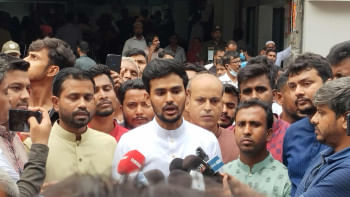The Colour of My Skin

I very often remember the words of Professor Abdullah Abu Sayeed, who, to instill hope, confidence and encouragement in the minds of the young students, used to say, 'Amader alokito manush chai desh gorar jonno)' – We need enlightened people to build our country.
Thinkers and great teachers want to involve the youth in development and educate and empower them with the required knowledge and skills to become responsible citizens of the country. They find it very important to let them grow with the right kind of mindset. Members of our younger generation who have grown up with proper guidance are doing well in different fields both in their own country and abroad.
Apart from the political polarisation and its destructive campaign, there is another campaign that is going on unhindered and unnoticed.
I am trying to put light on the dark 'fair skin' campaign in our television, newspapers, radio, billboards, wall posters and in all other available media. In a TV ad, our cricketing superstar Tamim Iqbal tells a teenager who so enthusiastically came for his autograph, "This is not the time for autographs; it is time for photographs." He was modelling for a fairness cream marketed by a multinational company. And what would be its impact on the mindset of the dark skinned boy--he does not need to practice and train day and night, day after day anymore to become a world class cricketer, whom people love. The message is loud and clear: if someone can rub some fairness cream for a few weeks and become fairer, people will love him and will rush towards him to get his autograph.

This is one of the many unsavoury campaigns about our skin colour, which is influencing the majority of us to think of ourselves as inferior. In another outrageous TV campaign, a dark skinned female reporter is not being called to put her question forward in a press conference. After using a fairness cream, she becomes fairer and is now being called to ask questions. It means that without being fair or light skinned you cannot be a good reporter or a journalist. Ironically many young resourceful journalists and reporters in our electronic media are dark skinned.
Bangladesh is a melting pot of ancient cultures and peoples. The early groups of people who came from the southern and western part of the Subcontinent and settled here are known as Dravidians. They are darker than the people of the east and west of South Asia. Then came the Aryans from the northern part of the Middle East and the eastern parts of Europe. They came to South Asia around 1200 BC and flourished in Haryana-- 'the land of the Aryans'. Over the centuries they mingled with the Dravidians. With the spread of rice cultivation, this mixed population of Aryo- Dravidians moved into the Bengal basin after the 600 BC and laid the foundation of their civilisation. They in turn mixed with Austric and Mongoloid people who were already in Bengal and produced the diversified physical types and skin colour which are nowadays so common in Bengal. Along with that, Bengali ancestry also includes Turks and Pathans who also invaded this part of the world.
The Muslim rulers – the Mughals and Afghans--ruled this land for hundreds of years, during which we do not know or find any reference that they used the colour of their skin to facilitate their rule longer or to called others inferior.
But in the colonial times the British rulers redefined 'beauty' to their own convenience. To be beautiful you must be light skinned. It was definitely a political move. They have successfully reconstructed our mindset, that to receive respect and better status in the society you are supposed to be like them. They were so successful that though colonialism ended in 1947, we still associate fair skin with nobility, prosperity and the so-called aristocracy.
Nandita Das, the beautiful Indian actress, who has also directed films like 'Firak' is dark skinned. The Indian obsession with skin complexion has made her upset. She has signed up with a Chennai based network called 'Women of Worth' (WoW) to combat the Indian obsession with fair complexion. A large portion of the Indian population has become obsessed with the fairness products of different multinational and national companies. Their business in India is booming and has crossed the billion dollar mark. Nandita's campaign 'Dark is Beautiful' has just been launched. May be we need someone like Nandita Das to build such a platform.

 For all latest news, follow The Daily Star's Google News channel.
For all latest news, follow The Daily Star's Google News channel. 



Comments